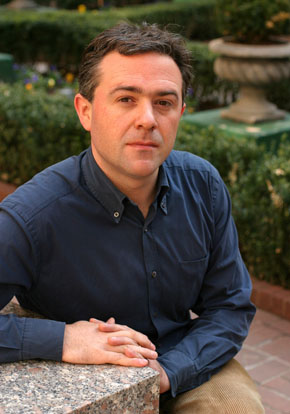Climate change poses enormous environmental, economic, and diplomatic challenges for India, and its choices will have international consequences, predicts author and journalist Edward Luce.
Climate change isn't an abstract threat in India, where the Ganges is already being impacted by melting Himalayan glaciers. India's response to the crisis will demand that the global community finally cast off antiquated, romantic notions of India and wake up to the reality of a nation that is poised to displace Japan as the world's third-largest economy by 2030, says Luce.
Luce will discuss "Mystic India in the Age of Global Warming" as the featured speaker for the Ninth Annual Sidhartha Maitra Memorial Lecture on Sunday, October 18, at 4 p.m. in the UCSC Music Recital Hall. His talk is free and open to the public, but tickets are required. Tickets are available online through santacruztickets.com or by phone at (831) 459-2159. Parking will be available in the Performing Arts parking lot; permits will be available for $3. Luce's presentation will include a question-and-answer session and will be followed by a public reception.
Luce is the Washington bureau chief of the The Financial Times of London and the author of the 2006 book, In Spite of the Gods: The Strange Rise of Modern India. Before moving to Washington, Luce was based in New Delhi as the newspaper's South Asia bureau chief from 2001 to 2005. In addition to his career in journalism, Luce spent a year as the speech writer to Larry Summers, then-U.S. treasury secretary under President Clinton.
India is a nation positioned for greatness, but it is still seen by many as a country of "snakecharmers and holy cows" that transcends materialism, said Luce. Such persistent misperceptions place India at a terrific disadvantage as the global community gears up for this winter's Copenhagen summit on climate change. India is resisting strenuous calls for targeted carbon-emission reductions.
"India is being asked to undercut its ability to develop, but fewer than two-thirds of the people in India have electricity," he said. "They can't cut emissions without consigning more people to darkness for years to come."
India, which is home to 20 percent of the world's population, contributes only 4 percent of the world's global carbon emissions--and has generated only 1 percent of historic emissions, he said. "It would be grossly inequitable to ask them to cut more in a nation where per capita income is $1,000," he said. "Comparable reductions in the United States would mean the average American would have to downsize from an SUV to a normal, gas-guzzling car. In India, if you haven't got electricity, exactly what would you downgrade to?"
The answer, said Luce, lies in a new, low-carbon development pattern that will require the assistance of the entire global community. If Western nations insist instead on a global cap-and-trade program, Luce predicts they will never reach agreement with India and China--to everyone's peril.



